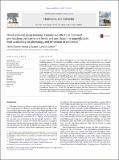Developmental programming : Cumulative effects of increased pre-hatching corticosterone levels and post-hatching unpredictable food availability on physiology and behaviour in adulthood
Abstract
Prolonged exposure to stress during development can have long-term detrimental effects on health and wellbeing. However, the environmental matching hypothesis proposes that developmental stress programs physiology and behaviour in an adaptive way that can enhance fitness if early environments match those experienced later in life. Most research has focused on the harmful effects that stress during a single period in early life may exert in adulthood. In this study, we tested the potential additive and beneficial effects that stress experienced during both pre- and post-hatching development may have on adult physiology and behaviour. Japanese quail experienced different stress-related treatments across two developmental life stages: pre-hatching corticosterone (CORT) injection, post-hatching unpredictable food availability, both pre- and post-hatching treatments, or control. In adulthood, we determined quails' acute stress response, neophobia and novel environment exploration. The pre-hatching CORT treatment resulted in attenuated physiological responses to an acute stressor, increased activity levels and exploration in a novel environment. Post-hatching unpredictable food availability decreased adults' latency to feed. Furthermore, there were cumulative effects of these treatments across the two developmental stages: quail subjected to both pre- and post-hatching treatments were the most explorative and risk-taking of all treatment groups. Such responses to novel environments could enhance survival in unpredictable environments in later life. Our data also suggest that these behavioural responses may have been mediated by long-term physiological programming of the adrenocortical stress response, creating phenotypes that could exhibit fitness-enhancing behaviours in a changing environment.
Citation
Zimmer , C G G , Boogert , N J & Spencer , K A 2013 , ' Developmental programming : Cumulative effects of increased pre-hatching corticosterone levels and post-hatching unpredictable food availability on physiology and behaviour in adulthood ' , Hormones and Behavior , vol. 64 , no. 3 , pp. 494-500 . https://doi.org/10.1016/j.yhbeh.2013.07.002
Publication
Hormones and Behavior
Status
Peer reviewed
ISSN
0018-506XType
Journal article
Collections
Items in the St Andrews Research Repository are protected by copyright, with all rights reserved, unless otherwise indicated.

